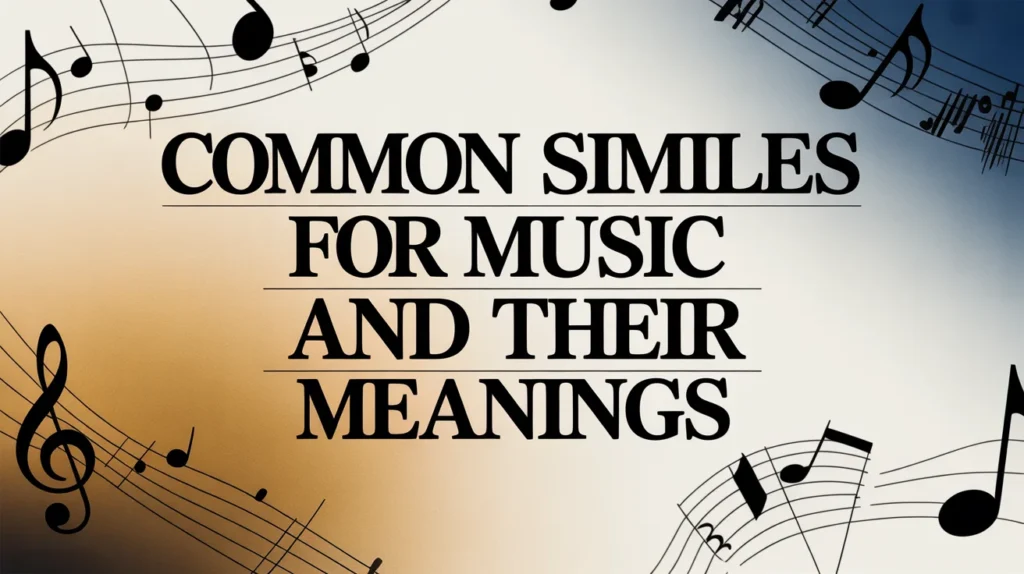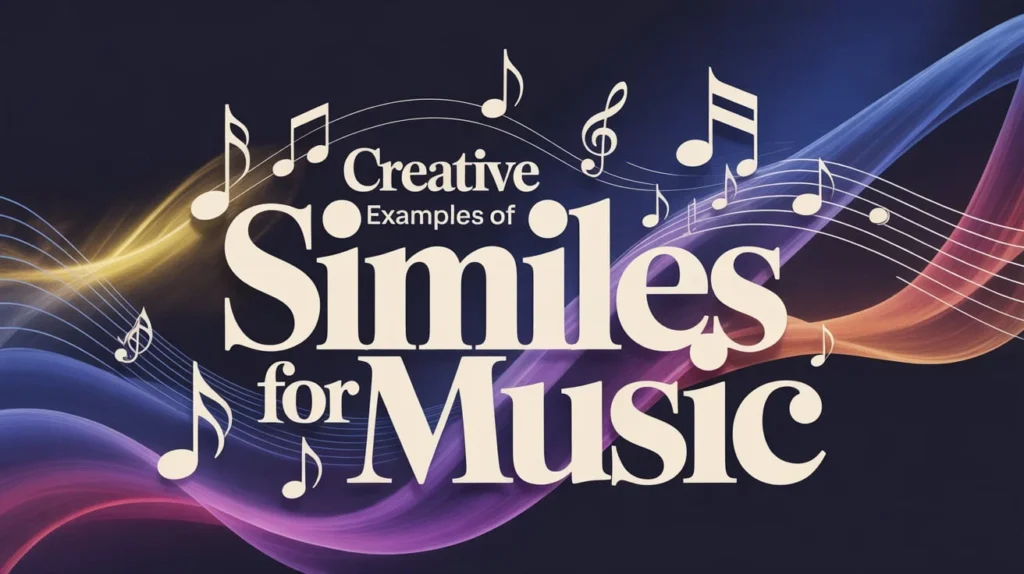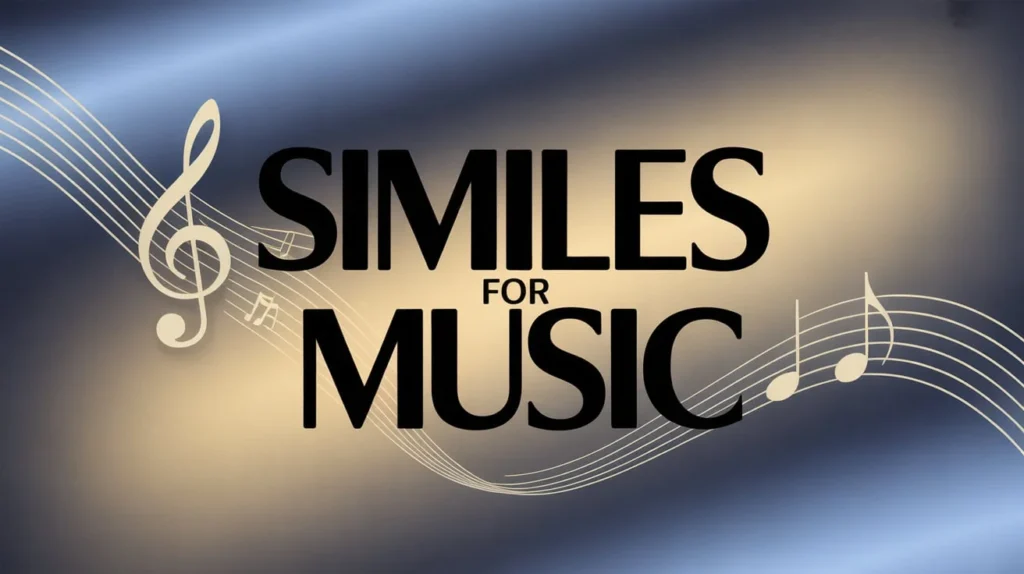Music has a language of its own—it can move hearts, paint emotions, and tell stories without uttering a single word. When writers want to describe music, they often reach for similes—beautiful comparisons that make sounds come alive on the page. In this article, we’ll explore similes for music, understand their meanings, and see how they add poetic beauty and vividness to writing.
Whether you’re a writer, poet, student, or music lover, learning how to describe music creatively can elevate your expression from ordinary to extraordinary.
What Are Similes for Music?
A simile compares two different things using words like “as” or “like.” For example:
- “Her voice was as soft as music drifting through a dream.”
Similes for music help readers feel the sound. They turn simple sentences into emotional experiences by connecting music to things we already know—nature, emotions, or sensations.
Here’s a quick comparison:
TypeExampleMeaningSimple SimileHer laughter was like music to my ears.Pleasant and joyful sound.Poetic SimileThe melody was as smooth as silk on skin.Describes elegance and smoothness.Emotional SimileHis song was like a cry in the night.Expresses sadness or longing.
Why Similes for Music Matter
Music is not just heard—it’s felt. That’s why simple words like “nice,” “melodious,” or “sweet” often fall short. Similes help capture the depth of emotion, atmosphere, and personality in music.
They can:
- Enhance poetry, stories, and lyrics
- Improve song reviews or analyses
- Bring creative writing to life
- Help describe characters, emotions, or memories connected to music
Think of them as the bridge between sound and imagination.
Common Similes for Music and Their Meanings

Below is a list of powerful similes for music, grouped by tone and mood.
🎶 1. Similes for Beautiful Music
SimileMeaningAs soothing as a summer breezePeaceful and relaxing musicLike rain on a quiet nightGentle and calming soundAs pure as morning dewFresh and natural tonesLike the first light of dawnHopeful and inspiring melodiesAs sweet as honey on the tongueDelightful and pleasant musicLike a lullaby for tired soulsComforting and heartwarming music
These similes describe soft, emotional, or melodious music. Perfect for writing about love songs, piano tunes, or peaceful background music.
⚡ 2. Similes for Loud or Powerful Music
SimileMeaningLike thunder in the mountainsDeep and echoing powerAs fierce as a storm at seaChaotic or energetic soundLike a lion’s roar through silenceBold and commanding musicAs sharp as lightning through airElectrifying and fast-pacedLike an earthquake shaking heartsStrong bass or intense rhythmAs wild as fire in the nightPassionate, uncontrollable energy
These are ideal for rock, metal, or cinematic music descriptions.
🌹 3. Similes for Emotional or Sad Music
SimileMeaningLike tears falling on glassFragile and emotional toneAs lonely as a forgotten songNostalgic or sorrowful melodyLike a whisper in the darkSubtle and haunting soundAs fragile as a broken heartSoft and mournful toneLike rain over a graveDeep sadness or lossAs faint as fading memoriesSlow, distant music fading away
Writers use these to capture melancholy, nostalgia, or heartbreak in music.
🌈 4. Similes for Joyful or Uplifting Music
SimileMeaningLike sunshine dancing on waterHappy and vibrant soundAs cheerful as children laughingJoyful and energetic melodyLike a butterfly in flightLight and playful musicAs bright as a thousand starsFull of hope and wonderLike flowers blooming in springRenewal and happinessAs free as wind over hillsSpontaneous and liberating tone
These similes beautifully describe celebratory, positive, or inspirational music.
🌌 5. Similes for Mysterious or Enchanting Music
SimileMeaningLike moonlight over waterDreamy and mysterious toneAs deep as the ocean’s callHypnotic and alluring soundLike shadows dancing in fogSoft yet mysteriousAs silent as a secret songWhispering, magical melodyLike stars whispering to each otherDelicate and otherworldly tuneAs strange as dreams you forgetSurreal and elusive sound
These are perfect for fantasy writing, film scores, or mysterious melodies.
Using Similes for Music in Writing
Similes for music can appear in:
- Poetry
- Song lyrics
- Stories and novels
- Music reviews and blogs
Here’s how to use them effectively:
💡 1. Match the Mood
If your scene is emotional, choose a sad simile like:
“The violin wept like rain over a lonely city.”
If it’s joyful:
“Her laughter was like music dancing on sunlight.”
💡 2. Keep It Natural
Avoid overcomplicating. Instead of saying:
“The music was like ten thousand angels crying in a galaxy of eternal sadness.” Try: “The music was as sad as a lonely heart at midnight.”
Simple similes are often more powerful.
💡 3. Use Sensory Detail
Music isn’t just heard—it’s felt. Use touch, sight, and emotion:
“The melody wrapped around her like a warm blanket.” “The rhythm hit me like waves crashing on shore.”
💡 4. Use Similes to Build Atmosphere
In storytelling, similes can instantly shape the mood:
- Calm café scene → “The jazz was as smooth as melted butter.”
- Action scene → “The drums pounded like war in the distance.”
Creative Examples of Similes for Music

Here are some original and creative examples that can inspire your own writing:
- Her song was like sunlight trapped in a bottle.
- His guitar spoke like an old friend remembering love.
- The melody flowed like silk through candlelight.
- The music soared as free as a bird that forgot its cage.
- Her voice shimmered like moonlight touching water.
- The drums echoed like footsteps in a dream.
- The piano whispered like secrets under starlight.
- His humming felt as gentle as a mother’s hand.
- The flute danced like wind over wildflowers.
- The chorus rose like dawn after a long night.
Similes for Describing Different Instruments
InstrumentSimileDescriptionPianoLike raindrops on a windowSoft, rhythmic, gentle tonesGuitarLike a heart speaking in stringsEmotional and expressiveDrumsLike thunder rolling through mountainsStrong, powerful beatViolinAs fragile as glass tearsEmotional and delicateFluteLike a bird in springLight and airySaxophoneAs smooth as velvetDeep and soulful sound
These help bring instrumental music to life through imagery.
The Role of Similes in Music Reviews
If you write music blogs or reviews, similes can make your writing stand out.
Example:
- ❌ Boring: The song was relaxing.
- ✅ Better: The song flowed like a lazy river under the afternoon sun.
They make your reviews more visual, emotional, and memorable.
Table: Quick Reference – Similes for Music by Emotion
EmotionSimile ExampleBest UseHappinessLike bells ringing on a wedding dayJoyful or upbeat tunesSadnessAs quiet as a last goodbyeEmotional balladsMysteryLike whispers through fogAmbient or cinematicPassionAs wild as a burning flameRock, soul, or love songsCalmLike waves kissing the shoreMeditation or classical music
Internal Linking Suggestions
If you’re publishing this on a website, link to:
- “Similes for Sound” (related topic)
- “Metaphors for Music” (for deeper exploration)
- “Descriptive Words for Voice” (for writers or poets)
This helps boost SEO and keeps users exploring your content longer.
FAQs
1. What is a good simile for beautiful music?
A good simile for beautiful music could be “as soothing as rain on a quiet night” or “like honey dripping on the heart.”
2. How do you describe music in writing?
Use sensory and emotional words. Combine adjectives with similes, e.g., “The melody was smooth as silk and soft as a sigh.”
3. Why use similes when talking about music?
Similes make descriptions more vivid and emotional. They help readers feel the music, not just imagine it.
4. What are some similes for loud music?
Try “like thunder in the mountains” or “as fierce as a storm at sea.” They create a strong, impactful image.
5. Can similes be used in song lyrics?
Absolutely. Many songwriters use similes to express emotions—like “Your love is like a river, peaceful and deep.”
Conclusion
Music transcends words, but similes bring us closer to capturing its magic. By comparing music to nature, emotions, and sensations, we can translate sound into imagery that touches hearts and minds.
Next time you write about music—whether it’s a song, a poem, or a review—don’t just say it’s “beautiful.” Say it’s like moonlight on water, like laughter in spring, or like a dream that refuses to end.

Sarah Milton is a linguistics graduate and proofreader known for her sharp eye for detail. She writes for GrammerPro to help readers avoid common grammatical pitfalls and refine their writing style for both academic and creative contexts.

